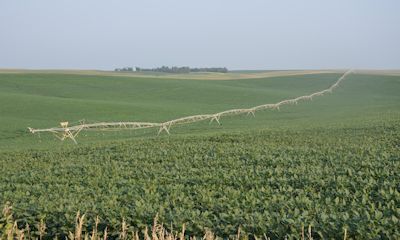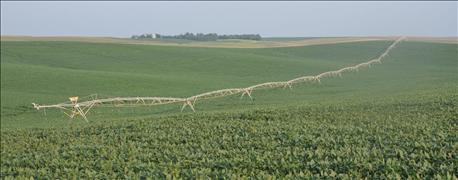
In late March, the Central Platte Natural Resources District's (CPNRD) board of directors approved the first transactions for a new Groundwater Exchange Program – the first of its kind in Nebraska.
CPNRD conducts permanent transfers on almost a daily basis, but this is the first time anyone's implemented a temporary exchange program, says Lyndon Vogt, general manager at CPNRD.
"What we're trying to do is bring people together that have certified irrigated acres they're willing to leave dry with someone else who could possibly make their operation more efficient by adding a few acres, by allowing a pivot to go all the way around instead of part way around, for example," Vogt says.

FIRST OF ITS KIND: The Groundwater Exchange Program allows producers to buy or sell water on an annual leasing basis for the upcoming irrigation season in temporary leasing transactions. While the Central Platte NRD conducts permanent transfers on a regular basis, this is the first time a temporary exchange program has been implemented.
How the program works
The Groundwater Exchange Program allows producers to buy or sell water on an annual leasing basis for the upcoming irrigation season. A seller can be anyone with a certified groundwater use on irrigated acres – like pivot corners, irregularly-shaped fields or even full sections. A buyer could be anyone looking to improve or add to their currently certified groundwater use or anyone looking to increase streamflow.
Here's how it works: A computer program matches up irrigation bids with sellers. Both buyers and sellers need to be pre-approved by making an appointment with CPNRD staff. During the pre-approval visit, staff will verify the water rights to be sold or bought and provide the buyers and sellers an identification number to be used during the bidding process.
CPNRD's Rules and Regulations regarding the transfers of groundwater irrigated acres are built into the computer program. Bids are based on consumptive use and streamflow depletion to the Platte River. Pre-approved buyers and sellers go online and place their asking price to temporarily lease water, or place bids to buy water for the upcoming growing season.
"Irrigators, landowners, or anyone else interested just needs to come in and show us exactly what acres they want to sell or what acres they want to put water on," says Vogt. "We can't add new consumptive use or have a negative effect on the river. We've got to do all the technical work ahead of time, so when the transactions go into place, we don't have a negative impact on stream flow."
A booming interest
While the initial transactions were limited to the first 50 participants, the board gave out bid IDs for 40 different sections of land, notes Vogt. This included six buyers. Of those six, three wanted to buy acres to put into irrigation, and three wanted to purchase water for in-stream flow bids.
"The three interested in adding a few acres were all successful in purchasing water for the upcoming growing season for the acres they wanted," Vogt says. "I think if we would have had more buyers looking at acres, they would have been successful."
If the board decides to continue the Groundwater Exchange, the bidding window would likely be open for a longer period of time and would begin in November after harvest.
Interested participants can learn more about the program at www.market4water.com. The website contains information, documents and links for the Groundwater Exchange Program; which is managed by NERA Economic Consulting (NERA) on behalf of the CPNRD.
About the Author(s)
You May Also Like






